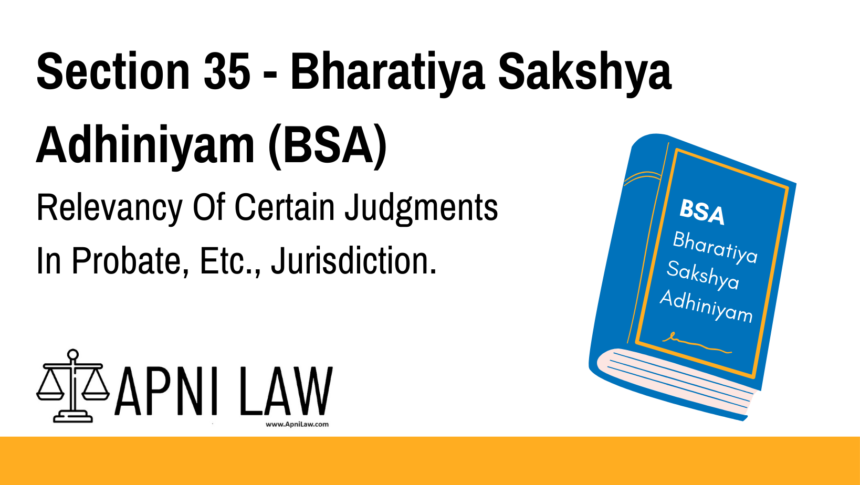Code
(1) A final judgment, order or decree of a competent Court or Tribunal, in the
exercise of probate, matrimonial, admiralty or insolvency jurisdiction, which confers upon
or takes away from any person any legal character, or which declares any person to be
entitled to any such character, or to be entitled to any specific thing, not as against any
specified person but absolutely, is relevant when the existence of any such legal character,
or the title of any such person to any such thing, is relevant.
(2) Such judgment, order or decree is conclusive proof that—
(i) any legal character, which it confers accrued at the time when such judgment,
order or decree came into operation;
(ii) any legal character, to which it declares any such person to be entitled,
accrued to that person at the time when such judgment, order or decree declares it to
have accrued to that person;
(iii) any legal character which it takes away from any such person ceased at the
time from which such judgment, order or decree declared that it had ceased or should
cease; and
(iv) anything to which it declares any person to be so entitled was the property
of that person at the time from which such judgment, order or decree declares that it
had been or should be his property.
Explanation
Section 35 focuses on the legal weight of “judgments in rem” — i.e., judgments that determine a person’s legal status or rights against the whole world, not just specific parties.
This includes:
- Probate matters (e.g., granting of a will)
- Matrimonial matters (e.g., divorce or annulment)
- Admiralty (maritime jurisdiction)
- Insolvency (declarations of bankruptcy)
A final judgment from a competent authority in these cases:
- Is a relevant fact when legal character or entitlement is in question.
- Is conclusive proof of such character, entitlement, or property at the time declared in the judgment.
Illustration
Example 1:
A person claims a property based on a will that was probated by a court. The probate judgment is not just relevant — it’s conclusive proof that the person had legal title to the property from the date specified.
Example 2:
A person’s status as legally divorced is questioned in a later case. A family court’s final divorce decree is conclusive evidence that the legal character of “spouse” ceased from the date of the decree.
Common Questions and Answers
1. What’s the difference between a “relevant” and “conclusive” judgment?
A “relevant” judgment can be used as evidence. A “conclusive” judgment cannot be challenged in that respect — it must be accepted as true.
2. Is a divorce decree conclusive under this section?
Yes. A final divorce decree conclusively proves the termination of the legal character of “marriage” from the date mentioned in the decree.
3. What is the significance of “not as against any specified person but absolutely”?
It means the judgment applies universally — for example, declaring a person bankrupt affects all creditors, not just one.
4. What if a judgment was obtained fraudulently?
Judgments obtained by fraud can be challenged. Section 35 applies only to valid and final judgments from competent courts.








